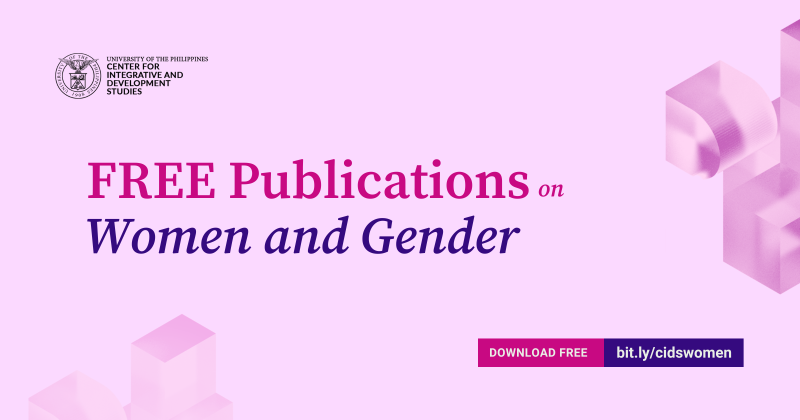For International Women’s Day: FREE Publications on Women and Gender

In celebration of Women’s Month this March, here are 10 UP CIDS policy papers that shed light on various aspects of women empowerment and rights.
Barriers to Filipino Women’s Political Representation
This policy brief aims to (1) present the situation on women’s representation in electoral politics; (2) point out significant barriers to women’s entry into electoral politics; and (3) recommend key policy directions and ways forward to address persistent issues.
Empowering Filipino Women Seafarers in the Maritime Sector
This study finds that patriarchal beliefs and control in the seafaring industry have discouraged women sea officers from pursuing careers at sea. Using the women’s empowerment framework developed by Sara Longwe and the human rights-based approach as guides, this policy research paper proposes a package of measures to empower women by addressing issues on welfare, access, conscientization, mobilization, and control in the maritime industry.
Exploring Pathways to Empowerment: A Narrative of the Bangsamoro Women Migrant Workers
The socio-economic empowerment of Muslim families in the country relies, to a great extent, on how their women migrant workers (WMWs) are nurtured and enabled to become nurturers and enablers of themselves and of others. This paper pursues the empowering feminized narrative, having considered the significance and relevance of the empowerment processes in the context of feminized global labor migration.
Integrating Gender Concerns in Anti-Poverty Strategies
The aim of the policy study is to assess the situation of Filipino women in poverty prior to the 21st century. The paper ends with recommendations on the integration of gender concerns in anti-poverty strategies.
Pipe Dream for the Ladies: Constructs of Rights of Prostituted Women among Social Actors in the Sex Industry of Olongapo City, Zambales
Underpinned by constructivism theory, this article explores the social constructs of actors within the prostitution sector, particularly concerning the rights of prostituted women in Olongapo, through their material conditions. Findings reveal that the laws and policies on prostitution are largely dissociated from the construct system of the prostituted women.
Marxism and Ecofeminism in the Era of Climate Change: Convergence and Divergence
Marxists lay the blame for climate disasters on the doorstep of global capitalism, but ecofeminists add to and critique the Marxist discourse via gendered explanations about capitalism’s predatory nature rooted in its patriarchal moorings. This monograph chapter explores recent discoveries in Marx’s writings that sympathize with the environmental cause. It also features the ecofeminist perspective, which both affirms and critiques Marxism.
#MeToo: A Comparative Study of the #MeToo Movement in the United States and South Korea Using Collective Action Frames and Hashtag Feminism
This journal article compares the #MeToo movement in the United States and South Korea and evaluates factors influencing its sustainability. It concludes that while the US movement benefits from influenced policies and legislation, South Korea lacks such protective measures. This suggests that policy and legal reforms are crucial for institutionalizing #MeToo’s main goals of protecting women and providing justice to victims of sexual abuse.
The 2019 Expanded Maternity Leave Law: A Law Whose Progressive Potential Has Yet To Be Fully Realized
Given the disruptions and volatilities that characterize the present world of work, social protection measures such as the Expanded Maternity Leave Law of 2019 assume greater developmental significance. However, strengthening the law and its implementation, especially considering its relatively recent enactment, necessitates an inquiry into its current status—its accomplishments thus far, as well as the pressing issues and challenges it confronts.
Women Reinventing Culture: Their Role as Cultural Patrons in Postwar
This essay explores the roles and impact of women as patrons through case studies of former First Lady Imelda Romualdez Marcos, former Art Association of the Philippines President Purita Kalaw Ledesma, and former publisher Gilda Cordero Fernando. It also examines the contributions of women in cultural bureaucracies such as the Cultural Center of the Philippines and the National Commission for Culture and the Arts.
Women Warriors: Empowered Women in Southeast Asian Literature
The figure of the woman warrior serves as a unifying image for the various representations of empowered women in the literature of Southeast Asia (SEA). This article aims to feature and discuss selected works from SEA that present narratives of women struggling to free themselves from oppressive cultural traditions and cope with the disruptive events in the history of their countries.
About UP CIDS
Established in 1985 during the presidency of then–UP President Edgardo J. Angara, UP CIDS is a policy research unit of the UP System. It is mandated to encourage collaborative and rigorous research addressing issues of national significance by supporting scholars and securing funding, enabling them to produce outputs and recommendations for public policy.
Visit the UP CIDS database and download over 900 (and counting) policy papers for free